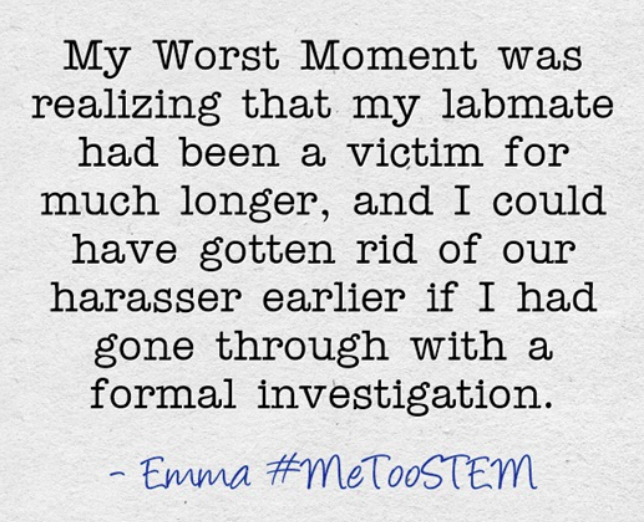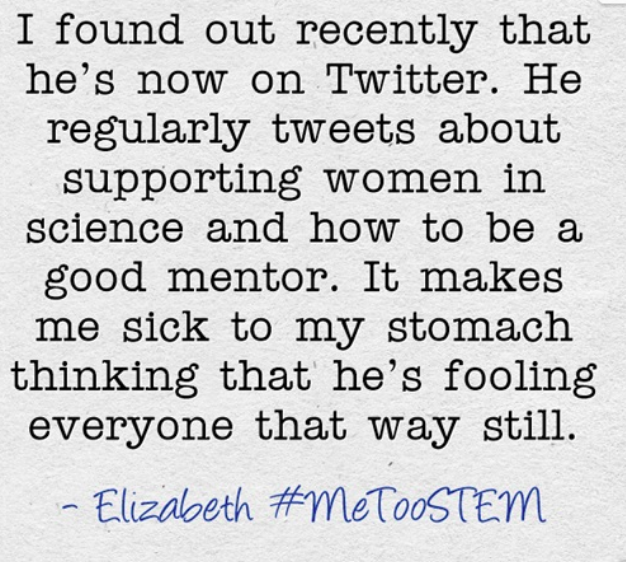Our names are not Elizabeth and Emma.

“Elizabeth and Emma” - inspirational photo provided by authors
Elizabeth: For about three years, I was sexually harassed by a postdoc who was in a position of power over me-both during my masters and at the start of my PhD. We started off as great friends and colleagues, but things started to fall apart after the first time he told me he had feelings for me. Despite clearly telling him that I did not return them, he continued to pursue me and even got a postdoc in the same lab I was to do a PhD in. He yelled at me over getting a boyfriend, told me to stay away from his office, and bragged to members of the lab and the department that we had had a relationship-which was a lie. He would do this all while intermittently telling me that he was still in love with me and that was why he was acting that way, despite me pleading with him to stop and suggesting we go our separate ways if he couldn’t handle working with me in a productive way. He always convinced me he would change his ways and do better.
It eventually got so bad that I began sitting in the other lab I was co-advised in (away from him) and started trying to pull out of the projects we had together. It was a constant flip-flop between feeling like I could handle him (when he was happy and acting like a friend to me) and when he would get angry with me after I would mention my boyfriend, etc. I eventually reported him to Title IX with the help of my PIs. He quit before the investigation concluded but he was eventually found at fault. Only later-when Elizabeth initiated her formal investigation-did a Title IX email tell me I wasn’t alone. This did feel affirming, even though the email told me I couldn’t learn any details. A few more months later, the postdoc quit and his departure was announced to our lab. Elizabeth and I finally identified each other and had a conversation.
There’s currently no way for me or my university to let other universities know that this individual has demonstrated this behavior. He’s still telling everyone who will listen that he did nothing wrong. He also is lined up to teach courses to other students-which likely shouldn’t be happening given his behavior. His students and employers may want to be aware that he has exhibited this behavior in the past.
Emma: When this postdoc started in our lab, I was a second-year PhD student. We shared scientific interests, and given our friendly lab culture, I thought we would also be friends. Over time, he started catching me alone and referring to his “complicated” love life. I thought he might have been flirting with me.
Then, he started bringing up how much he loved “big boobs”-something that seemed targeted at me, in particular. Every time we talked for weeks, he brought up how much he loved big boobs. Once, he bragged to me and another labmate about how his comments made women at his previous university uncomfortable-but they eventually “got used to it.” Ha ha ha.

After he started making hand gestures for grabbing big boobs, I visited the Title IX office. I didn’t know whether it was worth pursuing a formal investigation, because I was unsure whether his behavior was “enough” to remove him from our lab. I didn’t want anyone to know about it if it wasn’t.
No one else had (yet) reported him at our university. But because of his boasts about harassing other women, I specifically asked Title IX if they could find out whether he had been reported at his previous university. They said there was no way to know.
I felt alone, and I was scared of facing an investigation alone. So I took one of Title IX’s suggestions and personally asked him to stop. Only later-when Elizabeth’s formal investigation was completed, and his departure was announced-did I learn that I wasn’t alone.
My Worst Moment:
Elizabeth: There have been multiple. First, having an actual full-blown panic attack after hearing that he might be staying at the university permanently rather than just for a 2-year post-doc. I thought I could wait him out, but the idea that he would be there for all five years of my PhD was too terrible. Second, wondering if, because he was my mentor, I was a decent scientist without him and whether I would survive in the field. Third, finding out that he had harassed my labmate and I could have filed against him long before he ever got to my PhD university and had the chance to do that here. I felt like it was my fault. And last, the fear I felt when I found he was appealing the decision. Reading the appeal was also horrific.
Emma: Realizing that my labmate had been a victim for much longer, and I could have gotten rid of our harasser earlier if I had gone through with a formal investigation. When I told my Mom, she said that “next time-because there will be a next time” maybe I “would be brave enough to do the right thing.”
I Have Given Up On:
Elizabeth: I sometimes feel like giving up. I know I can’t, though. There are so many things about this process that need to be better. We can do so much better.
Emma: Nothing. The system is broken, but I’m determined to get it fixed. Victims of sexual harassment need more ways to share their stories, so that they can support each other and their bosses can stop putting perpetrators in unsafe positions.
I’m Afraid:
Elizabeth: Of what he’s telling other people and further retaliation. I found out recently that he’s now on Twitter. He regularly tweets about supporting women in science and how to be a good mentor. It makes me sick to my stomach thinking that he’s fooling everyone that way still.

Emma: I’m afraid that the rules and the hierarchy are fundamentally designed to protect the criminals, not the victims. I’m afraid to call out this postdoc by name, and I don’t fully understand why. Why should I be afraid of him losing more jobs “mentoring” other young women?
This Has Cost Me:
Elizabeth: Time. Peace of mind. Relationships with my collaborators and having constant fear of making new connections in the field who are already connected to him. Not feeling safe on campus and not feeling safe outside of it because he might retaliate.
Emma: Feeling safe walking around my own lab, getting coffee from the machine near his office, or having beers with coworkers.
Something You Should Know About Me:
Elizabeth: I have had a difficult past, so I have fairly high anxiety. This made reporting more difficult. I also would tell myself constantly that it was ‘not that bad’ and believed I could just tolerate it. I think this is why it went on so much longer than it should have. Not to mention that the people doing this are often gaslighting their victims, and those who already have a great deal of self-doubt or anxiety will struggle more with that. We need to be more transparent that these kinds of behaviors are NOT OKAY.
Emma: I found the courage to call the postdoc into my office and tell him to f*** off. After that, he never harassed me (or spoke to me) again. But he didn’t stop harassing others. Fixing one victim’s problem-or even two victims’ problems-doesn’t fix the aggressor’s problem.
Is There a Bright Side:
Elizabeth: He’s gone from our university. He quit before the investigation concluded. And I was able to connect with a labmate. It’s therapeutic to share your story and now there is an opportunity to do so. Of course I wish that none of this happened, but I am grateful to know how important it is that these processes need changing. I have something concrete to fight for now.
Emma: I am lucky that my immediate scientific community has been supportive. Our PI did the right thing, and he did it as soon as he found out. All of my friends and colleagues (male and female) reacted with shock and support. This gives me hope that other scientists with the power to hire and fire will do the right thing to protect their female employees.
My Fight Song:
Elizabeth: Kesha - Praying (I hated this song when it first came out, but I’ve had a change of tune…)
Emma: Rihanna - Bitch Better Have my Money
Secret Weapon:
Elizabeth: My PIs and labmates and my SO. They all stood by me through a lot and I would not have reported it otherwise. They are understanding and they reaffirm me. My PIs still give me time and space to vent and to recover. My SO also was a huge asset and hung on through days of crying, me starting to sleep for 12-15 hours at a time, and going home to stay with my parents for an extended period to just get away from campus. My dog was also a big help! He is a little ball of love and on the days where I didn’t want to get out of bed, I would for him. The fresh air always made things a bit better.
Emma: Friends and exercise! And the realization that our voices are our power. What’s stopping us from using them?